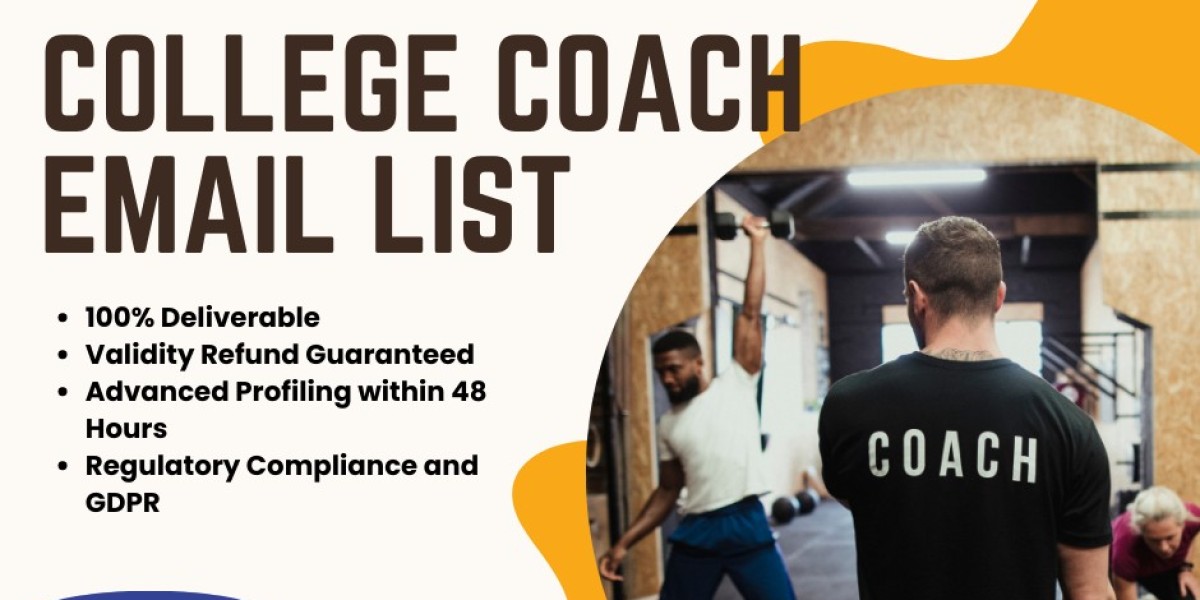Introduction:
In today's competitive sports landscape, athletes are constantly striving to gain an edge and secure their future in college athletics. One of the most effective ways to achieve this goal is by utilizing a college coach email list. This comprehensive resource connects athletes with college coaches, enabling them to showcase their skills and talents directly to the decision-makers. In this article, we will explore the benefits and importance of a college coach email list, as well as provide insights into how athletes can make the most out of this invaluable tool.
What is a College Coach Email List?
A college coach mailing list is a curated database of contact information for college coaches in various sports. It includes email addresses, phone numbers, and sometimes even mailing addresses of coaches from different colleges and universities. Athletes and their families can use this list to reach out to coaches and initiate a conversation about potential recruitment opportunities.
Why is a College Coach Email List Important?
A college coach email list is essential for athletes who aspire to play college sports. It provides a direct line of communication with coaches, eliminating the need to rely solely on chance encounters or third-party intermediaries. By having access to a comprehensive email list, athletes can proactively showcase their skills and express their interest to college coaches, increasing their chances of being recruited.
How Does a College Coach Email List Work?
A college coach email list works by connecting athletes with college coaches through direct email communication. Athletes can obtain the email addresses of coaches in their sport and send personalized emails expressing their interest in the program. Coaches, who are actively seeking talented athletes, often review these emails and use them as a starting point for recruitment discussions.
Building an Effective College Coach Email List
Building an effective college coach email list requires thorough research and organization. Here are some steps to help you create a valuable email list:
- Identify Your Target Schools: Begin by identifying the colleges and universities that align with your athletic and academic goals.
- Research Coaching Staff: Research and compile a list of coaches who are responsible for recruiting athletes in your sport at each target school.
- Find Contact Information: Look for the email addresses and other contact details of the identified coaches. This information is often available on the college's athletic department website.
- Organize the Information: Create a spreadsheet or use a contact management system to organize the collected information, ensuring easy access and efficient communication.
- Keep the List Updated: Regularly update your college coach email list by adding new contacts and removing outdated information.
Strategies for Engaging College Coaches
To effectively engage college coaches through email, athletes should consider the following strategies:
- Personalization: Tailor each email to the specific coach and program, highlighting why you are interested in their school and how you can contribute to the team's success.
- Highlight Achievements: Showcase your athletic accomplishments, academic achievements, and any relevant extracurricular activities to demonstrate your well-roundedness.
- Research the Program: Familiarize yourself with the coach's coaching philosophy, the team's recent performance, and any notable alumni to show your genuine interest in the program.
- Express Gratitude: Thank the coach for their time and consideration, emphasizing your eagerness to learn more about their program.
Standing Out in the Inbox: Crafting Compelling Emails
Crafting compelling emails is crucial to grab the attention of college coaches. Here are some tips to help your emails stand out:
- Subject Line: Use a concise and attention-grabbing subject line that clearly indicates your purpose and captures the coach's interest.
- Introduction: Begin with a polite and professional greeting, introducing yourself and expressing your interest in the coach's program.
- Body of the Email: Keep the email concise and engaging, focusing on your key strengths, achievements, and why you believe you would be a valuable addition to their team.
- Call to Action: End the email with a call to action, such as requesting a phone call or an opportunity to meet in person, to encourage further communication.
The Do's and Don'ts of Emailing College Coaches
When emailing college coaches, it's essential to follow certain guidelines. Here are some do's and don'ts to keep in mind:
Do's:
- Do personalize each email for the specific coach and program.
- Do proofread your email for grammar and spelling errors.
- Do follow up if you don't receive a response after a reasonable time.
- Do send thank-you emails after any interactions with coaches.
Don'ts:
- Don't use a generic email template without personalization.
- Don't send mass emails to multiple coaches at once.
- Don't rely solely on email communication; consider other forms of contact as well.
- Don't pester coaches with excessive emails or phone calls.
Showcasing Your Skills: Creating an Impactful Athlete Resume
An impactful athlete resume is an essential tool when reaching out to college coaches. Here are some key elements to include:
- Contact Information: Provide your full name, email address, phone number, and links to your athletic profiles or highlight videos.
- Academic Achievements: Highlight your academic accomplishments, including your GPA, standardized test scores, and any relevant academic awards.
- Athletic Achievements: List your athletic achievements, such as championships, MVP awards, and records, demonstrating your dedication and success in your sport.
- Extracurricular Activities: Include any leadership roles, community service, or other extracurricular activities that showcase your well-roundedness and character.
- References: Consider including references from coaches, teachers, or mentors who can vouch for your character and abilities.
Leveraging Social Media to Attract College Coaches
Social media platforms provide athletes with additional opportunities to capture the attention of college coaches. Here are some ways to leverage social media effectively:
- Create a Professional Image: Ensure your social media profiles present you in a positive and professional light, avoiding controversial or inappropriate content.
- Showcase Your Skills: Share photos, videos, or highlights of your athletic performances, allowing coaches to see your skills and potential.
- Interact with Coaches: Engage with college coaches on social media by following their accounts, liking their posts, and occasionally commenting on relevant content.
- Research Platform Policies: Familiarize yourself with the NCAA and other sports governing bodies' regulations regarding social media usage, ensuring compliance.







